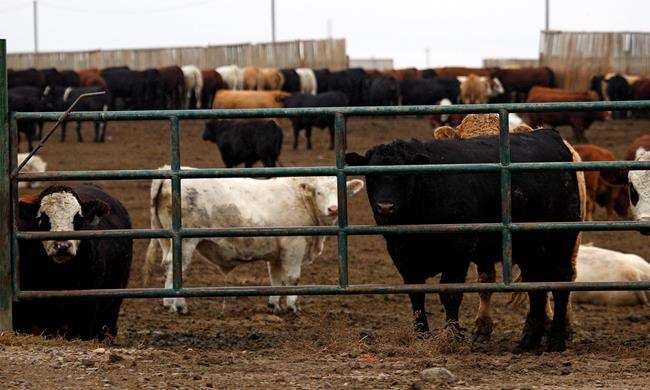Meat supply chain needs improvement
Advertisement
Read this article for free:
or
Already have an account? Log in here »
To continue reading, please subscribe:
Monthly Digital Subscription
$1 per week for 24 weeks*
- Enjoy unlimited reading on winnipegfreepress.com
- Read the E-Edition, our digital replica newspaper
- Access News Break, our award-winning app
- Play interactive puzzles
*Billed as $4.00 plus GST every four weeks. After 24 weeks, price increases to the regular rate of $19.00 plus GST every four weeks. Offer available to new and qualified returning subscribers only. Cancel any time.
Monthly Digital Subscription
$4.75/week*
- Enjoy unlimited reading on winnipegfreepress.com
- Read the E-Edition, our digital replica newspaper
- Access News Break, our award-winning app
- Play interactive puzzles
*Billed as $19 plus GST every four weeks. Cancel any time.
To continue reading, please subscribe:
Add Free Press access to your Brandon Sun subscription for only an additional
$1 for the first 4 weeks*
*Your next subscription payment will increase by $1.00 and you will be charged $16.99 plus GST for four weeks. After four weeks, your payment will increase to $23.99 plus GST every four weeks.
Read unlimited articles for free today:
or
Already have an account? Log in here »
Hey there, time traveller!
This article was published 09/05/2020 (1981 days ago), so information in it may no longer be current.
When Canadians flocked to their grocery stores to stock up for the pandemic lockdown, most weren’t filling their carts with plant-based proteins.
It was the meat counters that cleared out along with the toilet paper shelves, baking ingredients, and other basics considered necessities.
While more Canadians have been experimenting with these plant-based proteins, most continue to include at least some meat on their menu.

It’s safe to say that most of us prefer not to think about the part between animals living on the farm and their presence on our plates, aside from demanding assurances that they don’t unduly suffer.
However, the COVID-19 crisis has shone a spotlight into the dark shadows that now can’t be ignored in the meat-processing sector.
Industry concentration in search of economies of scale means that upwards of 85 per cent of Canada’s beef comes from three processing plants owned by two non-Canadian companies. Seventy per cent of the country’s beef supply comes from two plants in Alberta most affected by COVID-19 casualties.
The National Farmers Union has been flagging packer concentration as a concern for years. In a recent report the organization noted that in 1988, there were 119 federally inspected beef packing plants in Canada, all Canadian-owned. It blames the continued focus on increasing export volumes for the decline in local processing.
“The pursuit of maximum exports has resulted in a corporate beef sector that extracts all it can from workers, farmers, taxpayers, consumers and agricultural ecosystems,” it says.
Nearly half of the 2,000 workers in the Cargill-owned Alberta plant have tested positive to COVID-19, which points to a stunning failure by its management and public health officials to protect the health and safety of workers.
It’s also become clear in the aftermath that this travesty is about more than plant safety. These plants rely heavily on imported workers who routinely share accommodation and transportation and for whom it was impossible to self-isolate.
Closing the plants to bring the situation under control has pushed back to the farm and feedlots where upwards of 130,000 head of cattle are on hold, increasing feeding costs and depressing market prices. Similarly, pork processors have been temporarily closed forcing hog producers to euthanize young animals because they have run out of room in their barns.
The repercussions have rippled up through the supply chain, creating shortages and higher prices for consumers, and now, for taxpayers.
Governments have stepped up to provide $100 million in assistance to cattle and pork producers, along with $77.5 million to the Canadian meat-packing companies to make their plants safer. More will likely be necessary.
It all leaves a bad taste that threatens to drive consumers away.
Coincidentally, sales of plant-based burgers, which were soaring already, have picked up the pace even more due to meat shortages in the U.S., the Washington-based online news agency The Hill is reporting.
This is cause for celebration among anti-meat campaigners (as well as for shareholders in these new ventures.) Nothing would please them more than to see consumers turn their backs on meat products for good, citing everything from global warming to environmental to welfare to health issues as reasons.
COVID-19 has shown us rapid behavioural change is possible, so it’s conceivable to see this as a turning point in our psyche around consuming animal products.
Plant-based proteins have their merits but they are not a simple nutritional substitute for meat.
As for the land, some protein plants such as legumes have the remarkable ability to produce their own nitrogen. However, while some plants are more efficient than others at using available phosphorus, there are none so far that can produce it.
The best we can do to conserve essential but finite resources like phosphorus is to recycle them. Even the plants used to make Beyond Meat burgers need phosphorus to grow.
Well-managed livestock systems — with emphasis on well-managed — are important nutrient recyclers. As well, turning forages into protein through cattle is often done on land that is otherwise unsuitable for growing crops.
Canadians are right to demand improvements to this country’s meat-supply chain. But abandoning it altogether would leave us even more vulnerable to future food shortages.
Laura Rance is vice-president of content for Glacier FarmMedia. She can be reached at lrance@farmmedia.com

Laura Rance is editorial director at Farm Business Communications.
Our newsroom depends on a growing audience of readers to power our journalism. If you are not a paid reader, please consider becoming a subscriber.
Our newsroom depends on its audience of readers to power our journalism. Thank you for your support.


